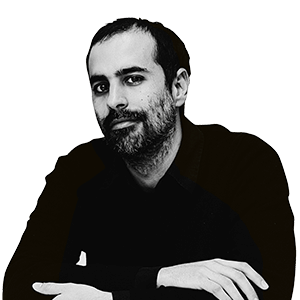"I'm tired of watching LGBTI films where the conflict is the discovery of homosexuality."
Jaume Claret Muxart premieres his debut film 'Extrany riu', a magnetic river road movie


BarcelonaWhen he was two years old, one day his parents were in London and his grandmother was looking after him, Jaume Claret Muxart (Sant Cugat, 1998) was electrocuted while removing a plug. "The light went through me," explains the filmmaker. "And it's the first image I remember, a circle like a cartoon. It's kind of funny because I ended up making cinema, which is the art of light." Whether or not it's because of that original electric shock, in Claret Muxart's films there is restlessness and trembling, but above all a plastic intensity that can be appreciated in the images shot in 16 mm.Strange river, hedebut film which this young director (26 years old) premieres on Friday.
Premiered in the Orizzonti section of the Venice Film Festival and presented at the last San Sebastian Film Festival, where Claret Muxart studied film at Zine Eskola Elías Querejeta, the film was born from the director's observations during the trips he took with his family following the course of the river by bicycle. He, however, insists on distancing himself from the autobiographical genre. "The starting point is personal experiences, but from there the imagination comes in," he explains. "For me, cinema is the opportunity to make possible what didn't happen, but could have happened. I remember riding my bike with my family and thinking: "What if I met a person in the river?" Starting from that idea, I wanted to explore a somewhat ghostly character. In reality, what you imagine can be as real as what you live."
Strange river accompanies a Catalan family on their vacation in Germany, where Danubio guides them through the forests of a Black Forest that indifferently watches the awakening of the sexuality of the eldest son, Didac (Jan Monter). Who knows if this will be the "last vacation" as a family, either because at 16 he begins to yearn for his own space or because of the cracks that open in the relationship between his parents (Nausicaa Bonnín and Jordi Oriol). In his head, the frustration of an unrequited attraction to another boy and an undefined erotic drive boil. However, the conversation with an understanding father, although in need of updating ("Dad, I don't like boys; I like Gerard," the son has to tell him) makes it clear that this is not the coming of age gay that we see coming. "I'm tired of seeing LGBTI films in which the conflict and trauma are the discovery of homosexuality, and in which some parents don't live well with that, but in the end they end up reconciling with it," says the director. "I wanted to make a film in which this had already been overcome, that was a little more pansexual."
The Catalan James Dean
To embody this character halfway between childhood and maturity, Strange river It features the vulnerable yet magnetic gaze of debutant Jan Monter, who conveys the incandescence and vulnerability of adolescence with his ambiguous mannerisms. "He has a timeless cinematic presence that reminds me of James Dean; with this hunched body, he's right at that moment of vital transition," says Claret Muxart, who saw more than 800 kids during nearly four months of casting. Monter was roughly number 600. "When he showed up and sat in the chair, it was like: wow! He changed our faces," he recalls.
In the importance that Claret Muxart gives to bodies and movement, the escape from classical narrative and the militant adoption of 16mm celluloid, there are enough clues to see a filmmaker who is more at odds with the current of new Catalan cinema than might appear at first glance. In this sense, he acknowledges that he wanted to make "a very expressive film, almost expressionist in its cuts, rhythms, and colors" and to escape from naturalism. "Realism does interest me, at least poetic realism, which has to do with finding cinematic truth," he reflects. "But I was very clear that I didn't want to perpetuate the naturalism of current Catalan cinema. In fact, filmmakers who are key figures in that naturalism, like Mar Coll and Carla Simón, are also opening up to poetry in their films."
The director's interest in the expressionism of the image connects him with his maternal grandparents, who were painters. As a child, in fact, he spent many hours in the studio of his grandfather, Jaume Muxart, watching him paint. "He taught me many incredible things about art, but also its dangers," he explains. "He was from Tàpies' generation and lived in Paris, but he didn't know how to sell his work and didn't have anyone to accompany him in this process." If the family is one of the director's artistic schools (his father is an architect, like Muxart's), it is not the same as the one in which he studied art.Strange river), the other two are the Zine Eskola Elías Querejeta and the educational project Cinema in Progress, where he arrived after dropping out of the audiovisual communication program at Pompeu Fabra by half a tenth and dedicating himself to making short films with friends, going to festivals, and the Filmoteca, where he met Núria Aidelman and Laia Colell, founders of Cine en Curso. "They welcomed me and it was my salvation," he says. "First I was a young programmer, then I coordinated the young programmers program, and for a few years now I've been one of the filmmakers at Cine en Curso, in schools in Puigverd and the Sant Andreu neighborhood."
